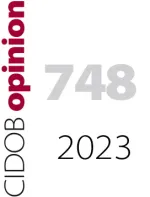Urban multilateralism in wartime: from symbolic to pragmatic solidarity?

In wartime, city diplomacy can be a useful tool for channelling multilevel responses and fostering inter-municipal solidarity. But this solidarity is too often more symbolic than effective. The “Generators of Hope” campaign, launched by Eurocities and the European Parliament, in which European cities are donating a large number of electric generators to their Ukrainian counterparts is an example of the pragmatic and efficient exercise of inter-municipal solidarity.
After nearly a year of conflict in Ukraine and with no end in sight, the international community continues to focus its efforts on two fronts: immediate aid; and laying the foundations of post-war reconstruction. Various actors are engaged in this endeavour. The international community may be formed above all of states, but it also includes the private sector, NGOs, civil society, and cities and their networks. That is why European Commission President Ursula von der Leyen recently restated the importance of alliances for the reconstruction agenda, making explicit reference to joint work with Eurocities, the network of large European cities. But to what extent can European cities be more than a token ally in this mission?
Too often international municipalism engages in performances that are more theatrical than practical. #CitiesWithUkraine was one example. Early in the war, hundreds of European mayors stood before their town halls and protested against the Russian aggression. As an act of solidarity it was more symbolic than pragmatic. However, unlike on previous occasions, the suffering of Ukrainian cities has led European counterparts to make major efforts to support mass refugee reception and humanitarian aid delivery. The contrast with the same cities’ much more reserved response towards Afghan and Syrian refugees is also clear. Selective solidarity? Perhaps.
In wartime, city diplomacy is a useful tool for channelling and organising multilevel responses. But it really adds value when mobilising resources, whether tangible (material donations) or intangible (knowledge). The profusion of initiatives intended to provide emergency aid to Ukraine thus comes as no surprise, and includes Prague donating 20 trams to Kharkiv (whose similarity means maintenance is very easy) and Barcelona donating two fire engines to Kyiv. Efforts to host refugees are also worth mentioning. Warsaw, for example, has taken up to 700,000 – a case of very palpable solidarity.
Prolific bilateral urban diplomacy has occurred over these months of war. A recent study by Eurocities estimated that 83% of the 105 European cities surveyed had established or intended to establish some form of alliance with a Ukrainian city. The country’s two main urban agglomerations of Kyiv (19%) and Kharkiv (15%) accounted for just 34% of those, with Odesa and Lviv following behind (both 12%). That the wave of solidarity seems to be reaching even smaller and less well-known cities is good news.
This bilateral diplomacy is being complemented by initiatives that may be categorised as urban multilateralism. “Generators of Hope”, launched jointly by Eurocities and the European Parliament at the end of November, is a paradigmatic example. With nearly 50% of Ukraine's energy infrastructure damaged by ongoing Russian attacks on power plants and grids, leaving over 10 million Ukrainians without electricity, few ideas seem more relevant than directing municipal solidarity towards the mass donation of generators and other high-voltage electrical equipment. Obtaining this type of material is currently the leading priority for most Ukrainian cities. Not only because electricity is essential to heat homes when the thermometers drop well below zero, but also, and above all, to keep facilities running like hospitals, schools, water services, mobile phone antennas and war shelters. Sending electric generators is not merely a simple, practical and timely measure, it is also easy to implement and allows cities to complement state actions.
Such complementarity is vital. The European Commission recently announced that since the beginning of the Russian invasion it has coordinated the donation of some 800 electric generators. While undoubtedly significant, it is still not enough, as the numbers show: at the end of November Eurocities had registered 21,151 requests for generators. The apparent shortage of such equipment on the market is the main problem, and most national authorities have already donated what they can. This is the context in which European institutions have begun to look towards local authorities, conscious of their potential to bridge the gap. Is this multilevel solidarity governance?
The key question now is whether it will be enough. How many cities will respond to the call? And will their response be generous enough to cover the enormous needs? To date, contributions have been registered from Rome, Berlin, Tallinn, Leipzig, Florence, Riga and Barcelona. No doubt many more will join in the coming days. But to achieve the target set, cities will have to demonstrate not only pragmatic solidarity, but also collaboration. Turku in Finland provides a good example: via a collection campaign targeting local companies and residents this municipality of 186,756 people secured 83 electric generators. Far more than the local administration could have achieved by acting alone.
The current context of multiple interconnected crises that reverberate globally and locally has given renewed meaning to the word solidarity, including within the municipal world. But the impact of such solidarity – a foundational value of international municipalism – has too often been more symbolic than tangible. The “Generators of Hope” campaign has just begun, but it already teaches an important lesson: to be effective, inter-municipal solidarity does not have to be particularly innovative or pompous; most of the time a simple, practical idea is enough. Something as mundane as an electric generator delivered in the middle of winter.
Keywords: cities, multilateralism, Ukraine, solidarity, war, Eurocities, European Parliament, European Commission